This innovative and high quality initiative links higher education in Catalonia with higher level vocational training programmes. It provides training in some of UVic-UCC’s areas of expertise, with the objective of serving the region and meeting the training needs of the various professional sectors, and training the specialised experts that its productive fabric requires.
The students on the UVic-UCC Professional Campus learn by working, by means of dual training (theoretical at the centre and practical in the company), which provides them with comprehensive training suited to real working conditions. The students study in a higher education environment, take advantage of the university's facilities and learn from teaching staff from both the university and professional spheres, thereby increasing the value and quality of the education they receive.
«The Professional Campus works with the surrounding area to improve the range and quality of training, and is organised in four centres in Vic, Granollers, Manresa and Olot»
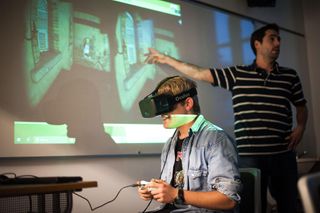
As a result of an agreement between the Balmes University Foundation and Vic City Council and the Education and Art Foundation, the Teknós centre in Vic teaches two computing and image training programmes - the Multiplatform Application Development programme, and the 3D Animations, Games and Interactive Environments programme. These programmes are a response to the emerging needs of the technology sector. The first programme trains young programmers in various development environments which are adapted to new trends in the sector, thanks to the professional profile of the teaching staff. The second programme is more closely related to the field of the image and audiovisual communication, but the knowledge the students gain gives them career prospects in areas beyond the video gaming industry, such as the fields of healthcare, art, communication and marketing. The two programmes are closely linked to the Faculty of Science and Technology, which enhances the quality and prestige of the vocational training.
In Granollers, thanks to an agreement with Granollers Town Council, Teknós_UGranollers teaches a programme in Marketing and Advertising that offers training for young people in line with the changes that digitalisation and e-commerce have caused in this professional field.
In Manresa, the UManresa Professional Campus organised by the Bages University Foundation offers three higher level programmes: in Dental Prosthetics, in Pre-School Teaching - Science and Experimentation, and in Administration and Finances for Sports Management. The latter is a partnership between the FUBages and the Joviat integrated vocational training centre.
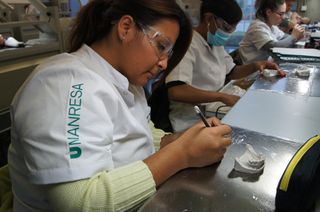
The Pre-School Teaching programme trains specialists in the area of experimentation and the introduction to science at early ages; meanwhile, the Administration and Finances programme focuses on young people learning to manage sports clubs and organisations, which are distinctive characteristics which enhance the career prospects of the future holders of higher diplomas. Finally, in the Dental Prosthetics programme, the involvement of leading companies in the project is crucial in providing training for young people who have adapted to the technological changes that the sector has experienced, both in terms of the tools used and how the training takes place. Thanks to these partners, Dental Prosthetics students can choose a dual training programme, but the programme also has technology advisers and suppliers of new machinery, which is essential for being able to offer a high quality programme.
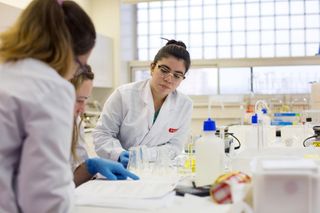
Finally, the Kreas Foundation, which is based in Olot and is the result of an agreement between the Balmes University Foundation and the Meat Business and Meat Industries Federation with the support of Olot Town Council, provides training in the agrifood field, in the Food Industry Processes and Quality programme, as well as various courses leading to professional certificates, training the operators and technicians at all levels that the agrifood industry needs. In the latter case, the distinguishing feature of both the training programme and the professional certificates is the dual training which is applied from the first day of training, and which enables students to remain with the companies they join for a long time.
«Students joining a dual vocational training programme do so through a training contract or a scholarship which will enable them to receive a financial grant and co-finance their studies»
Guaranteed experience and in-company training
The dual study system is a mixed alternative involving both employment and training, and is aimed at providing the worker-student with qualifications and professional skills, and involves working at a company and training at the centre. Students joining a dual vocational training programme do so through a training contract or a scholarship which will enable them to receive a financial grant and co-finance their studies. Students receive much more comprehensive training because they learn with professionals and develop their skills in the workplace, which improves their subsequent employment prospects.
This type of training increases the students' motivation, as they can clearly see how their studies can be applied, while at the same time it provides them with financial support and increases the links and shared responsibility of the business fabric in vocational training.
Advantages for the company
Dual vocational training contributes to improving companies' competitiveness by improving their human resource management, as it provides them with human capital with the personal and professional skills and abilities required to join the company.
Dual vocational training marks a return to the apprentice model, ensuring professional training that improves young people's qualifications and personal development. Dual vocational training enhances the student-worker's skills and performance at work. It emphasises practical training, and means that the company can participate in designing the contents of vocational training, training the individual according to the needs of companies, their processes and business culture.
The company engages with the social responsibility of promoting people's training and employability. Today's training is tomorrow's company.
«Higher education institutions play a key role in the development of human capital and innovation systems»
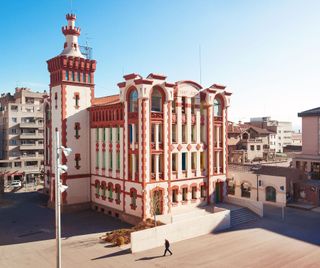
Working to learn, learning by working
The collaboration between the University and vocational training centres in higher education is a major change in the approach of both university and vocational training, but particularly in the way we consider the relationship between training and employment, which is a key factor in this process, which is essential for generating a new economy and consequently for the future employability of our young people.
Higher education institutions play a key role in the development of human capital and innovation systems, and are the core instrument in the development of countries, regions and territories.
The benefits of an integrated higher education system are obvious: it enables better use of resources - by means of appropriate tutorial work throughout the student's training process, in both vocational training and on university degree courses - by enabling them to redeem credits passed on tracks which they may initially have begun, and increased rates of return in both systems.
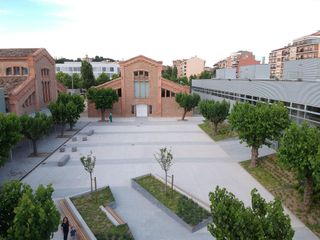
The University of Vic - Central University of Catalonia and the Professional Campus aim to provide an answer to all these questions, and believe that professional retraining must also take place within the parameters of a change in the personal perspective that enables us to grow and improve in every aspect of our lives. The range of combined learning between university education, continuing education and higher vocational training offers a very wide range of solutions to training expectations throughout the learner's life, and a combination of them will provide a complement to tracks in which the learners may have the appropriate qualifications. As such, it meets people's training needs throughout their lives.
One of the main focuses of the Professional Campus is to make talent, creativity, experience and knowledge emerge by creating different initiatives, so that their effect is multiplied when they are put in the same value chain. Entrepreneurship needs this space, this environment, this talent ecosystem.
The people behind the scheme

Núria Barniol, who has been director of the Professional Campus since its inception, has first-hand knowledge of the entire process and its development.
How do you get companies involved in the Professional Campus project?
It's not always easy. We start with a visit to the company and present the entire project, with the various alternatives for recruiting students, in both the practical training and dual training formats. Apart from the financial advantages, we tell them about the benefits for them of recruiting a young student in dual training, in terms of attracting and retaining talent.
The initial visit means that we can build up a relationship of trust, and find out the type of profile the company may need and the key skills and competences a student needs to join them. This company-student fit is often the key to success, and leads to a continued collaboration with the company. The fact that the company has a trial period before committing itself to taking on a student for dual training, and its active involvement in the selection of the candidate, are also very important aspects in making the relationship between the company and the educational centre a fluid one.
However, each professional sector is different, and dual training works very well for us in areas where there is a major need for trained staff, such as the agrifood and computing sectors, and it is more difficult in younger areas or those where the companies are smaller, such as the image sector.
«For students, dual training guarantees them knowledge adapted to real business conditions business and hours of experience in a workplace that means they can find employment quickly»
How do former students rate the dual training experience? And the companies?
Both sides rate the experience very positively, as evidenced by the fact that after graduating, most students still retain links to the companies where they trained, but now as workers. That is the great success of dual vocational training.
For students, dual training guarantees them knowledge adapted to real business conditions business and hours of experience in a workplace which means they can find employment quickly, either in the company where they were trained or elsewhere.
For the company, dual training means they can recruit a worker who already understands its culture, operations and business processes, who is adapted to its systems and is a good fit with the work team, which is a guarantee of success in any process for selecting or recruiting talent.
Do students find work related to their studies?
The post-graduation employment rates are very high. I would say that they are almost 100% among students who have completed dual training, but, as before, it depends to some extent on the professional areas they focus on. However, according to the latest study on work placement (the 2016-2018 cohort), only 8% of our graduates are actively seeking employment, 29% are still studying, 35% are also studying but are combining it with work, and finally the rest are only working (29%). Continuing education is important to our students. 64% continue their studies, and most decide to take a university bachelor's degree, but there are also some students who consider an advanced level specific vocational training programme to enhance their professional skills, or non-regulated training to specialise, which is especially true in areas such as animation, modelling, and video games.

Joan Turró, director general of the Balmes University Foundation, was the main driving force behind the creation of the Professional Campus at UVic-UCC.
What was the initial reason for starting vocational training in a university context?
About six years ago, the governing body led by Rector Montaña and the Board of Trustees, with the agreement of the Board of the Balmes University Foundation, made a strategic decision that the UVic would put itself in a position to offer tertiary education. In Europe, these courses have a clearly professional focus, but in Spain, higher education like the courses offered at university does not include vocational training programmes.
We realised because of its territorial position and its implications for the business world, it was crucial that for UVic to make a commitment to this type of education, and we produced a strategic outline based on the following points:
- We wanted to start providing high level training Programmes as long as they did not compete directly with other courses already under way which had a good reputation, and to help to improve the image of vocational training.
- We would try to get involved with high level vocational training in a dual format, and this would therefore entail reaching agreements with business sectors to ensure a more modern vision of vocational training, adapted to the needs of each professional field.
- We would work with programmes with a continuous university track, or in other words, we would support cycles where our students could continue on to bachelor's degree studies and end up having a university degree if they wish.
How do you rate how the Virtual Campus has been rolled out in the various cities?
We started on the first project in Olot, with a strategic agreement with the town's municipal council, the Meat Business and Meat Industries Federation (FECIC), and Vic City Council, to provide courses in the meat sector leading to an official qualification. The idea was to create a comprehensive training centre for the meat and agrifood industries (Kreas), which also provided vocational training courses, in situ teaching in companies, etc. The dual system has worked very well in this case, and we are considering expanding it to other areas of the food industry.
The Teknós project in Vic came about at the same time, with two technological qualifications and agreements with Vic City Council and the Education and Art Foundation. Major investments have been made in powerful computer equipment as a result of the courses taught at the centre. The project is now well established, and has the right number of students. At this centre, the dual format works very well in the areas solely related to computers, but it is more difficult in the image and sound cycle because of the size of the companies and a more scattered business structure, but the results are very positive.
The last project was the decision to create a qualification in the marketing field in Granollers, in collaboration with the towns' municipal council, which has also been up and running for three years in dual format.
«The idea now is to consolidate the existing training programmes, and to create regulations so that this area is increasingly a part of our institution's overall academic realm»
In the town of Manresa, the Bages University Foundation (FUBages) also made a strong commitment to three courses, including one in the very specific field of Dental Prosthetics, which also involved major investments and an important agreement with a leading company in the sector.
Is there a plan to expand the range of studies in this area?
Our idea now is to consolidate the existing training programmes, and to create regulations so that the Professional Campus, made up of all of our occasional training centres, is increasingly a part of our institution's overall academic realm.
Looking ahead to the future, we have just signed a collaboration agreement with Manlleu Town Council, according to which we will begin high level vocational training programmes in the town in the next few months, probably focusing on the areas of dietetics, automotion and probably economics and business. This will be the first step towards offering a range of university courses in Manlleu as well. The City Council has made a firm commitment to this by providing spaces, and there are agreements in place with training centres and the business community in the area.
Throughout this process, we have found that:
- the University community and all its members have a very good understanding of the strategic commitment behind vocational training programmes as part of the institution;
- the Ministry of Education of the Government of Catalonia has understood that the vocational training courses contribute value that enhances the reputation of professional training.
The idea that a high school student can decide to take vocational training programmes or a university degree is a very powerful one. Students choose one track or another based on their vocational aspirations, personal profile, etc., and this does not close off any future possibilities to them. A student can start a programme, pursue a bachelor's degree, and end up completing a doctorate. Students who prefer to have closer links to the business sphere can therefore keep all their options open.
The Professional Campus is therefore an idea that is becoming increasingly consolidated and is growing. It's an area that sets us apart and strengthens our roots in the region and our relationship with the business fabric. That is also important for our University's teaching staff, as they can see how some of the students in their vocational training programmes continue on to university studies at our centres.